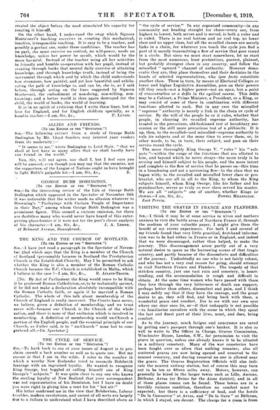THE CYCLE OF SERVICE.
[To THE EDITOR OF THE " SPECTATOR."] SIR,—To hark back to one of your issues of August is to pro- claim oneself a back number as well as to quote one. But my excuse is that I am in the wilds. I refer to the number in which a worthy New Zealander tried to reconcile Bolshevik leanings with an ingrained loyalty. He wanted to recognize King George, but boggled at calling himself one of King George's " subjects." It was quite clear to any one who knows the sterling loyalty of New Zealand that your correspondent was not representative of his Dominion, but I have no doubt you were right in giving him a vent for his " hot air."
His letter confirmed me in the view that Bolshevism, Labour troubles, modern revolutions, and unrest of all sorts are largely due to a failure to understand what I have described above as
" the cycle of service." In any organized community—in any community not heading straight for chaos—every one, from highest to lowest, both serves and is served, is both a ruler and is ruled. There is no real bottom and no real top, no lower class and no upper class, but all the so-called classes are merely links in a chain, for wherever you touch the cycle you find a part of it merely transmitting a flow of service that goes round in a circle. But since we must start somewhere, let us start from the most numerous, least pretentious, poorest, plainest, but probably strongest class in any country, and follow the miscalled " upward " channel of authority-. However demo- cratic they are, they place themselves and their destinies in the hands of selected representatives, who ipso facto constitute another class. These in turn, by means of Electoral Colleges or lower and higher Legislative Assemblies, pass on their powers till they reach—not a higher power—not an apes, but a point of concentration or a defile in the cyclical course. This defile may be a Cabinet, a Prime Minister, a President, or a King, or may consist of some of these in combination with different functions allotted to each. But in any case the miscalled "supreme " authority is merely a link in the chain or cycle of service. By the will of the people he or it rules, whether that people, in choosing its so-called supreme authority, has trusted to the precarious, old-fashioned test of hereditary suc- cession or the still more precarious test of a plebiscite. It is up, then, to the so-called—and miscalled—supreme authority to rule its subjects and at the same time to serve them, or, in other words, to be, in turn, their subject, and pass on their service round the cycle.
The more thoroughly King George V. " rules " his " sub- jects "—within the range of the functions that are allotted to him, and beyond which he never strays—the more truly is he serving and himself subject to his people, and the more intent and complete is the flow of service that he passes on—this time in a broadening and not a narrowing flow—to the class that we began with; to the so-called and miscalled lower class or pro- letariat, who are all in all to the King, to whom the King subjects himself, whom King George, like his father and his grandmother, serves as truly as ever slave served his master. We are all "subjects" one of another, whether Kings Or
East Persia.














































 Previous page
Previous page